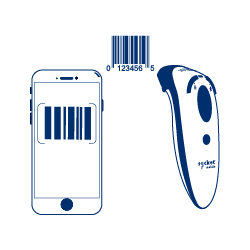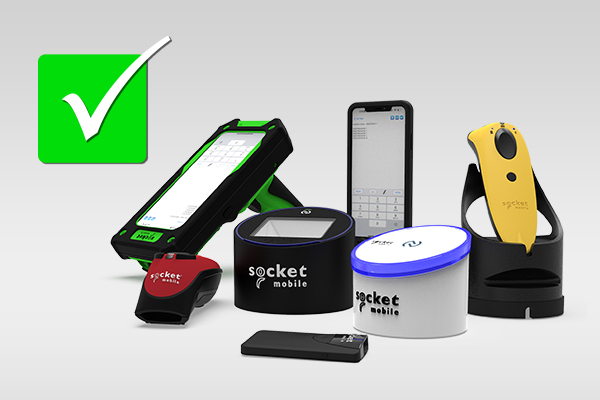Camera-Based Scanner vs. Bluetooth Barcode Scanner
Data Collection with mobile device or hardware scanner pros and cons
Camera-based scanning uses the camera on your mobile device, while Bluetooth hardware scanning requires an external scanning device. Know which solution is best for your business.

Traditional Camera-Based Scanning

Summary
Using the phone's camera is a good solution for general-purpose usage, such as checking prices or scanning a QR code.
Pros
- Set-up - Virtually no setup is required for default-supported barcodes.
- Cost - No need to pay for new scanners. Purchasing multiple barcode scanners can be costly.
- Photo-ability - Take pictures and attach them directly to data for timely problem-solving.
- Multitasking - Perform multiple functions such as taking a picture, passing images to applications, notating date & time, and passing quantities.
- Anytime Scanning - Most people carry and go everywhere with their smartphones. Scan on the go without carrying another scanner along.
- Storage - If a network is not available, you can store the barcodes into the phone to send later.
Socket Mobile's SocketCam family of camera-based scanners are more efficient than traditional built-in phone or tablet scan technology. See our extended list of SocketCam benefits.
Cons
* The SocketCam C860 overcomes some of the traditional camera-based scanners cons noted below.
- Scanning Ability* - Limited read range.
- Speed* - Slow scanning capabilities, especially in difficult lighting conditions.
- Battery Life - Powering the screen and running applications on the OS while scanning drains the phone's battery more quickly.
- Ergonomics - Smartphones and mobile devices, although ergonomic to a certain degree, are NOT designed for the specific purpose of camera/barcode scanning.
- Weight - Phones are heavy and not designed for repetitive scanning motions and angles.
- Agility - Mobile devices are less agile and more cumbersome.
- Scanning Process - Requires an element of focusing, with a viewfinder on top of the application and moving the device into range for the camera.
- Security - Data scanned on a device opens the opportunity for information to be shared outside. BYOD requirement makes it even easier for confidential info to leak.
- Total Cost of Ownership - A barcode scanner has a longer lifespan. It does not rely on the latest technology to operate, so it won't require replacement as often as a smartphone.
- Replacement Cost - Smartphones can be easily damaged while scanning and replacing them is more costly than a dedicated barcode scanner. Even with protective cases/enterprise sleds, smartphone screens can easily crack, which is expensive to repair and can make the device unusable.
- Lost Productivity - If the smartphone breaks before transferring data, the data will need to be rescanned.
- Operating System Updates - Smartphones require regular software and OS updates; barcode scanners do not.
- Limited Scanning - Not ideal for more than 20 scans per day.
Bluetooth Barcode Scanners

Summary
A dedicated barcode scanner is the best for large quantities of scanning, efficiency and cost-effectiveness.
Pros
- Performance - Barcode scanners are intended for a single purpose, making them faster and more reliable than a smartphone.
- Read Range - Reading range on a scanner is greater than a phone, allowing you to scan a variety of barcode sizes and distances.
- Ergonomics - Socket Mobile hardware readers are designed to be extremely ergonomic and comfortable in the hand for a full day's scanning.
- Weight - Scanners are lightweight, minimizing wrist movement and protecting the user from heavy repetitive motions.
- Agility- Hardware readers are agile and able to get into small spaces if needed.
- Scanning Process - Hardware readers are aim and fire and do not require as much time to focus.
- Battery Life - Barcode scanners have sleep modes and are only "on" when pulling the trigger or reading a barcode. Battery life is considerably longer than a smartphone.
- Integration - Scanner doesn't require any drivers or specific software to use with a computer.
- Security -Since scanners are not designed to store or share data, there is minimal danger of a data breach. You cannot download data-altering apps or other software onto the scanner.
- Cost Efficiencies - Scanners are single-purpose devices, less complex and less expensive to buy and maintain.
- Total Cost of Ownership - Barcode scanners do not rely on the latest technology to perform and don't need to be replaced as often as a smartphone.
- Replacement cost - Smartphones are not designed to be scanners and can be easily damaged. A barcode scanner is less expensive to replace if it breaks.
- Extensive Scanning - Great for 100+ scans per day, saving substantial time and comfort.
Cons
- Photo-ability - Barcode scanners can't take pictures.
- External Device - A separate device is required to transmit the scanned data to.
- Charging - Barcode scanners must be charged separately from the host device.
If you are having issues with your data reader, please review our FAQs for a solution.
